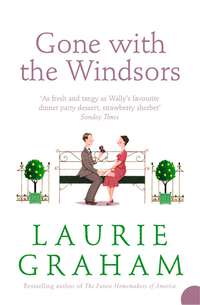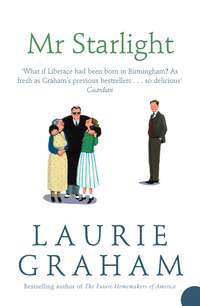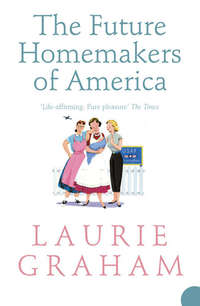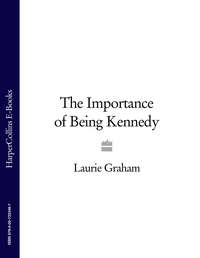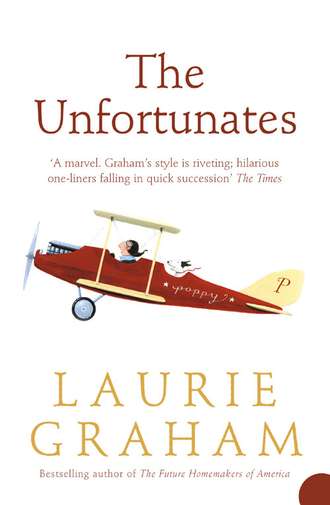
Полная версия
The Unfortunates
‘We’re Jewish, you see,’ I told them.
‘You don’t say!’ Ethel laughed.
They wondered why he hadn’t given me a ring before he left with the American Expeditionary Force.
‘We want to test our love first,’ I explained.
‘Uh-oh,’ Junie said. ‘First you get the ring. Then you test the love.’
I could have kicked myself. I had a pink tourmaline at home that would have served. It had been Grandma Plotz’s. Honey got the brilliant-cut sapphire because she was the eldest, and I got the tourmaline.
Next the Red Cross girls wanted to see Oscar’s picture. I played for time, day after day pretending I had forgotten to slip it into my pocketbook.
‘I should have thought,’ said a person called Mrs Considine, ‘you would carry him next to your heart.’
‘Yes,’ said Ethel, throwing down the gauntlet. ‘Seems pretty odd to me. No ring. No picture.’
That night I set to work. I carved up an old photograph from Honey’s debut year, took from it the head and shoulders of John Willard Strunck, and fitted it to my gold locket. John Willard Strunck once danced a cotillion with my sister but he had subsequently died of thin blood and dead men tell no tales.
At the Red Cross next day everyone huddled around admiring my beau.
‘He’s cute,’ Junie said. ‘Real blond and wholesome looking, for a Hebrew.’
‘Does he write often?’ Mrs Considine wanted to know. She said she got letters from her son all the time. That woman was trouble.
I pleaded Oscar’s slow passage across the Atlantic Ocean while I considered what to do next. I had no idea how often a soldier might write to his sweetheart. Nor did I know what kind of things he’d tell me. How often he would fight the Hun, or whether I should allow him to be wounded. I thought perhaps a minor wound, about three months into his tour of duty. Something large enough to excite admiration, but too small to warrant repatriation.
I had a slight unease, which I pushed repeatedly to the back of my mind, that I might be playing with Oscar Jacoby’s real fate. What if I said he was wounded and then fact followed fiction? What if he became a famous war hero? How would I explain not being at his side when he returned in triumph? And what if he was killed? What if he sensed that somewhere his courage was being talked up, and he ran blindly into battle, anxious to live up to his reputation?
I began to have a nightmare in which Aunt Fish and Mrs Considine were playing trumpets and a bandaged man forced me to dance the tango. His bandages kept unwinding and getting under my feet. Sometimes underneath the bandages I seemed to see John Willard Strunck and sometimes there was no one under there at all.
I was relieved when someone from the Women’s Bureau telephoned Mrs Brickner and asked for the loan of a bright and willing person who understood French.
‘Looks like I’m on my way to join Cousin Addie,’ I said, as I waved Ethel and Junie goodbye.
‘Heck,’ Junie said, ‘wouldn’t it be the wildest thing if they sent you the same place they sent your beau? I sure hope he’s behaving himself.’
‘You take care now, Hot Stuff,’ Ethel called. ‘Don’t you go getting shot or anything.’
‘So far as I am aware,’ Mrs Considine said, ‘enemy fire has not reached No. 5 Depot.’
And so it turned out. It wasn’t the front I was bound for at all, but Front Street, where a fissure had appeared in American – French relations, caused by badly judged shipments of nightwear.
A large perspiring woman handed me two pages of close-written mystery. ‘Please translate,’ she said. ‘I have boxes here waiting to be filled and shipped.’
I’m sure I might have made shorter work of it had she not stood over me, wheezing and dabbing her brow.
‘It seems to be about pajamas?’ I ventured.
‘Well I know that,’ she snapped back.
I threw her morsels of information as best I could.
‘They require larger sizes. No. They require no large sizes. They want small sizes, and medium. And they prefer blue cotton. Not stripes.’
Gradually she stopped perspiring and treated me with the respect due to an interpreter.
‘What a gift to be able to puzzle out such gibberish,’ she said. ‘Do they mention nightshirts at all?’
By the time I had wrung all the meaning I could from the French requisition she had quite taken to me.
‘If only I could hold onto you,’ she said. And I permitted her to do so for the remainder of the day, helping to finish up packing twelve hundred pairs of leatherette bedroom slippers and making a start on pajamas and convalescence suits.
It was gratifying to know that I’d helped ensure that the more capacious sizes of hospital wear went to our fine American boys instead of being wasted on small Frenchmen. And it was good to make new acquaintances and hear new stories, especially from one sweet girl who read us her husband’s latest letter. He was with the 212th Field Artillery but she didn’t know exactly where. A soldier was not allowed to say.
On the trolley-car home I began composing Oscar’s letter. ‘My own little girl,’ it began. I was hoping that Ma might have had another fatiguing day preserving root vegetables. I hoped she would favor an early night so I would be left in peace to practice styles of handwriting.
The house was silent. The more I called for Ma the more she didn’t reply, and all I found were jack cheese sandwiches, cut on the diagonal and left under a dainty chain-stitched cloth. I had been abandoned.
I called Honey, but Harry answered and before I could tell him Ma was missing he said, ‘Ah, Poppy. Just the person I need. Could you possibly run over and give us a hand? Our help’s doing war work, you know, and it’s all getting rather too much for Honey.’
I said, ‘Why can’t you help? I’ve just put in a day’s war work myself.’
‘Oh be a sport, Poppy,’ he begged me. ‘Just an hour. Honey’s been caring for Sherman Ulysses all day but she’s just had to go and lie down. You have no idea how taxing it all is, and there’s no sign of dinner.’
But I had a very good idea. I could hear my nephew playing his drum, right up close to the telephone. Still, Honey never did have much vigor.
I said, ‘I can’t help you. I have to send out a search party for Ma. Why don’t you get dinner at your club?’
‘I intend to,’ he said, ‘just as soon as Honey rallies enough to put the boy to bed. Seeing as his aunt isn’t willing to put herself out a little.’
I replaced the handset on its cradle. That was the beauty of telephone conversations. One click and you could disconnect Harry.
I tried Aunt Fish next, but there was no reply. Neither were the Misses Stone at home, and Mrs Schwab had not yet succumbed to the vulgar intrusion of a telephone in her house. I resorted to calling Mrs Lesser, who adored the telephone and stayed by it every moment she wasn’t at Penn Station pouring coffee for doughboys in transit.
‘How right you are to worry,’ she said. ‘One hears such horrors. Have you checked the kitchen stairs? She might so easily have missed her footing.’
We discussed other possibilities. Murder. Kidnap. I believe she was quite disappointed when I mentioned the sandwiches.
‘Then her absence seems to have been anticipated,’ she said, ‘and I must ask you not to occupy the line any further. I expect a call from my sister in Nyack momentarily.’
Ma appeared at the unwontedly late hour of half past seven and interrupted me just as I had decided to stop pacing the floor and exploit such rare solitude. When Ma was at home she never found it convenient for me to sing or lie stretched on the hearthrug.
‘Where have you been?’ I yelled. ‘I was all but ready to look for you in the morgue.’
She had the dull flush of a person who had been drinking sherry wine.
‘Poppy,’ she said, ‘I told you last night and again this morning, I was invited to Dear Yetta’s crush for starving Polish babies. How inattentive you have become.’
I’m sure I would not have forgotten such a thing. Had I been told, I’m sure I might have hurried home sooner from Depot No. 5 and accompanied Ma myself, to the house Yetta Landau shared with her brother-in-law, to the very home and hearth of my secret sweetheart, Oscar Jacoby.
Ma and Aunt Fish had been driven home in Mr Jacoby’s Studebaker automobile, but I was unable to find out much more than that. For a woman who had crossed Central Park twice in one day and partaken of intoxicating drink, Ma had surprisingly little to say for herself. She could give me no account of the people she had met, or the style of the Jacoby house, and when I asked whether she might arrange a little affair of her own, whether Miss Landau and her family might pay us a return visit, she only gave a contented sigh.
‘I think,’ she said, ‘I may take a powder and retire.’
She climbed the stairs, listing gently to starboard.
‘Please be sure to dock all the laws,’ she called, and disappeared into her boudoir.
My appetite restored by the knowledge that I wasn’t an orphan after all, I wolfed down the sandwiches and set to work on creating a love letter from my soldier on the Western Front.
‘My own little girl,’ I began.
Well here I am in Flanders’ field, killing the Boche and having a dandy time. I get off about six every night and I sure wish you were here with me so we could go out dancing. The eats here are pretty good. Still, I can’t wait till we have whipped the Hun and I can return to your loving arms. I know a girl like you won’t lack for gentlemen admirers, but I hope you can find it in your heart to wait for your devoted sweetheart, Oscar.
I wrote it first in a selection of styles until I hit upon a hand that looked manly. Then I made a fair copy on onionskin paper and jumped on it a while. By the time I was finished it had the appearance of having come to me through fire and flood, and for good measure, I slept with it under my pillow that night.
Oscar Jacoby was beginning to take on flesh.
He was good fun, I decided, with just the right amount of seriousness. He was a first-rate dancer, and he had cool hands, not clammy and pink like Harry’s. And he’d take a girl to supper and allow her to choose anything she liked, even two kinds of dessert. He wouldn’t give her a baby and leave her at home with it banging its drum.
Ethel Yeo gave me a sly smile when I showed them my letter next day. I turned away and when I looked again, she was still smirking at me.
‘As a matter of fact,’ I said, ‘my Ma dined with his people only last night.’
‘Yeah?’ she said. ‘And what division did you say he’s with?’
Hellfire and damnation if I just couldn’t remember whether I’d said he was with the 26th or the 28th. I pretended I hadn’t heard her. I excused myself and went to pay a call.
‘Never mind, Hot Stuff,’ she whispered, next time she came near me. ‘I’ll be able to ask him myself, won’t I? When he comes home from the war?’
THIRTEEN
In March 1918 the Bolsheviks surrendered to the Hun and Uncle Israel Fish took me to the theater to see Harry Lauder. Mr Lauder was a Scotchman. He wore a skirt and sang songs I couldn’t understand, but Uncle Israel seemed to enjoy them very much indeed. After the show we went to the Waldorf for champagne wine and oyster soup, and he said it would be a good time to have a little talk about my impending inheritance.
‘You’ll get a monthly allowance,’ he said, but he wouldn’t say how much. ‘Don’t want you running wild with it, Pops,’ he said. ‘And you’ll have a nice spread of stockholdings, keeping your money working for you.’
I said, ‘Will I be richer than Honey?’
‘What kind of a question is that?’ he said. ‘Harry’s made some smart investments for Honey. I’m not party to the details, of course, but Harry has a head on his shoulders. He has a nose for the coming thing.’
I remarked that I didn’t want Harry’s nose anywhere near my investments.
‘Never fear,’ Uncle said, ‘I’ll be managing your fund, and you’ll find me a more conservative investor than these young bloods. Stay liquid, that’s what I always advise. You won’t catch me buying big houses in Oyster Bay.’
That was Harry’s latest thing. He foresaw a need for convalescent homes on Long Island once we had won the war.
I said, ‘But when shall I be old enough to manage my own fund?’
I believe Uncle Israel looked a little hurt.
‘Well, of course,’ he said, ‘I shan’t be around forever. And when you marry …’
I said, ‘But I’m not allowed to marry. I have to stay home and take care of Ma.’
‘Who told you such a thing?’ he said. ‘Of course you’ll marry. And then your husband will advise you on your investments. But no hurry. I’m good for a few years yet.’
He ordered a rack of lamb with pommes de terre boulanger. It was news indeed to me that I was no longer expected to remain an old maid. I thought this over as we ate, Uncle making short work of the ribs while I concentrated on the potatoes. They were the best I had ever tasted.
The champagne wine had made me feel a little fizzy, but I was suddenly awake enough to see a connection between my secretly restored eligibility and the abrupt silences that fell whenever I walked in on Ma and Aunt Fish. They were matchmaking.
‘Uncle Israel,’ I said, ‘did you ever meet Mr Jacoby?’
He choked a little on a piece of meat and turned quite purple before he was able to catch his breath and order a glass of brandy. He dabbed at his eyes with his napkin.
‘Judah Jacoby?’ he said, eventually. ‘Yes, I know him. I remember his father, too. Of course, they were just importers when they started, but they’re in everything now. Everything from the pelt to the finished garment. Fine quality and square dealings. That’s Jacoby.’
I said, ‘His wife died, you know, and her sister helped him raise his sons?’
‘Oh yes,’ he said. ‘I hear all about it, never fear.’
I said, ‘And Oscar Jacoby is gone for a soldier. Do you happen to know which lot he’s with?’
‘No idea,’ he said. ‘Though I’m sure I’ve been told. I leave my superiors to keep up with that side of things.’
And he gave me a funny greasy smile. My heart was racing.
I said, ‘Uncle Israel, Ma and Aunt Fish are always laughing and whispering when they come home from the Jacobys’ but they don’t tell me anything. Do you suppose … ?’
‘Pops,’ he said. He leaned across the table and patted my hand. ‘I have learned not to suppose anything. Who can possibly fathom what Dora and Zillah find amusing? Perhaps they’re matchmaking. Perhaps they’re just enjoying their war. Now, who’s for charlotte russe?’
I went home with a warm, fluffy feeling inside my tummy. Ma was already in bed, but her light was still burning so I went into her and gave her a kind of hug that was not customary in our family.
‘Oh Ma,’ I said, ‘I’m so happy.’
‘Poppy,’ she said, ‘I do believe you’re tight. Did Israel explain everything? About your money?’
‘He did,’ I said. ‘He explained everything.’
Alone in my room I tried on Grandma Plotz’s tourmaline ring, then I lay down and counted my blessings.
1. By November I would be a mustard heiress and Uncle Israel would keep me liquid. Whatever that meant.
2. Destiny was conspiring with my mother and my aunt to unite me with none other than the very beau of my choice, Oscar Jacoby.
3. I was Jewish, to just the right degree.
FOURTEEN
Toward the end of July Mrs Considine received a Western Union telegram informing her that her son had been killed during the Battle of the Marne. I didn’t know him, of course, and I never much liked Mrs Considine but, still, I did feel sad for her, him being her only boy and now he wouldn’t be coming home. He had been a bugler, which sounded like a safe kind of soldier to be, so when I heard I became anxious about Oscar who was probably doing far more dangerous things.
A night nurse and a tutor were engaged for my nephew Sherman Ulysses and they accompanied my sister Honey when she went away to Long Island for her health. She had seen a number of doctors but every one of them gave her different advice and none of it helped. She tried sitz baths. She ate charcoal biscuits till her teeth turned black. And she had her magnetic fields adjusted by a person from Brooklyn who only ate nuts and berries.
It was my belief that Honey’s problems were the result of lying too much on her couch, but Ma believed quite the opposite.
‘Now she can really rest,’ I heard her say to Aunt Fish, after Honey had left for her convalescence, ‘because she won’t have Harry bothering her.’
As Honey faded, so I bloomed. I was much happier in my work because I could almost count in days when I would come into my money and be able to buy a field hospital and take it to France and be talked about, like Cousin Addie. Also, Ethel Yeo, who had become a thorn in my flesh always inquiring after Oscar and trying to catch me out, had left to become a manicurist at the Prince George Hotel. Junie Mack was gone, too, having caught a baby from a soldier, and although I missed her, this left me more at liberty to talk to any good-looking boys who passed through the depot. I had no intention of being unfaithful, but I welcomed the chance to gauge my powers of enchantment. I wanted to learn to spoon, so that when Oscar came home from the war I should be word perfect. I allowed one boy to walk me to the trolley-car and light my cigarette and everything seemed to be most satisfactory, but he never offered again nor was even especially friendly when he saw me.
Then an older man called Albert began to make love to me. He was thirty-two and couldn’t go to war because he had rickety legs, but in every other respect he was a handsome devil.
He took me to Riker’s for an ice-cream soda and asked me all about my fortune. Everything was going along just fine until he tried to put his arm around my waist. I told him to keep his distance. I told him I had no wish to catch a baby just when I was about to go to war, and the people standing nearby seemed to find this amusing.
I said, ‘I’m sure I don’t know what any of you find so droll. I’m one of the mustard Minkels and I’m going to buy a hospital and take it to France.’
This made them laugh all the more.
I said, ‘And I’d sure like to know why all of you are leaning on this counter, drinking sarsaparilla when you might be volunteering.’
That quietened them. I held my head high and made my exit, but I heard that Albert say, ‘Crazy kike.’
Of course, I hadn’t meant it about him not volunteering. I knew he was too old and crippled. It made me realize, though, how easily I might have gone the way of Junie Mack. Men seemed to believe treating a girl to an ice-cream soda entitled them to certain liberties.
Ma, meanwhile, was forever leaving off her knitting to go to any charity bazaar Yetta Landau might recommend, and sometimes to lectures on subjects relevant to the war effort. These, I know, she found as draining as she had once found the giving of dinners, but she tried to bear up and listen attentively, because she knew this would earn her Miss Landau’s respect.
‘As Dear Yetta says,’ Ma would report, rubbing her temples to ease her aching brain, ‘education is our hope and insurance against another war.’
Harry said he believed a safer bet was to shell the Hun until they came out with their hands raised.
‘President Wilson,’ Ma said, ‘has laid down Fourteen Points for peace.’
‘What are they Ma?’ I asked.
‘Poppy!’ she said. ‘There are fourteen of them! He has also devised Four Ends and Five Particulars, but I’m sure he doesn’t expect us all to have them by heart. And then there are all these new countries one has to know about. Montedonia. And Macenegro. It was all so much easier when there was just America and the rest of the world and one didn’t have to concern oneself with the little places. Aha! I have remembered one of President Wilson’s Points. Serbia must have a corridor to the sea!’
She produced this with a flourish.
‘I say, Dora,’ Harry said. ‘I’m impressed!’
Ma blushed.
‘Well,’ she said, ‘it may have been one of his Particulars, or perhaps one of his Ends, but anyway, there you have it.’
‘Never would have taken you for a bluestocking,’ he said. ‘Abe wouldn’t know you.’
‘What do you mean?’ she asked, sharper suddenly.
‘No. Nothing,’ he said, retreating as usual. ‘Nothing at all.’
I didn’t care for the way Harry was laughing at Ma. I knew she was doing all this for me, raising our stock with Miss Landau, paving the way to Oscar becoming my beau. I was proud of her and I told her so.
‘Why thank you, Poppy,’ she said. ‘I must say, sometimes I quite surprise myself.’
We sat for a while, after Harry left us, basking quietly in mutual contentment.
‘It occurs to me,’ Ma said, after a while, ‘that you might accompany me to Madame Paderewski’s lecture next week. It would broaden your education. Madame Paderewski is very desirous of Polish independence, you know?’
‘Will Miss Landau be there?’ I asked.
I cared nothing about the Polish. They might have their independence without bothering me over it. But I was avid to get any member of Oscar’s family in my sights. And so I fell in with Ma’s suggestion and hurried up to my room. I had only five days in which to prepare myself, and I wanted to strike the right note, or rather, a pleasing chord of spirited patriotism, savoir faire and unusual beauty. I decided I would leave off my turban, which Ma found worryingly foreign, and make a feature of my hair.
There was standing room only in the Fairway Hall. The Germans and Mr Lenin, Madame Paderewski explained, were picking over the remains of the Polish nation, but a committee had been formed, in Paris, to call a halt to this. Committees had really become quite the thing since the war started. Before that I don’t believe I had ever heard the word.
The Polish National Committee were getting up an army, and Madame Paderewski showed us on a large hanging map the places she said belonged in a united Poland. Silesia and Galicia. Poznania.
‘More countries to remember,’ Ma shuddered.
President Wilson, it seemed, was a true friend of the Polish nationalists, and one of his Fourteen Points was – here Ma dug me in the ribs – that an independent Poland must have a corridor to the sea.
‘Didn’t I tell you so?’ Ma whispered.
I said, ‘No. You said Serbia.’
‘Why, Poppy,’ Aunt Fish interrupted, a shade contemptuously, ‘everyone needs a corridor.’
Yetta Landau had been identified for me as an earnest-looking woman in a boater hat and a high-collared shirtwaist. She was sitting some distance from us, so Ma and Aunt Fish could do no more than smile and flutter their hands until the lecture ended and the donation buckets had been passed around and we were free to circulate.
Miss Landau shook my hand and hoped that I would do what I could for Poland.
‘Poppy is with the Red Cross, of course,’ Ma said. ‘In bandages.’
‘Important work,’ Miss Landau replied, ‘but we all have to ask ourselves what more we can do.’
She had a dry mouth that crackled when she spoke, and slightly gamy breath.
I said, ‘I shall be of age in November. Then I’m going to do something really important.’
‘Indeed?’ Ma said. ‘This is the first I heard of it.’
I said, ‘I’m going to buy trucks, like my cousin Addie, and drive them to the Western Front.’
Ma looked quite stunned. Miss Landau was studying my hair. I had allowed it full rein, and wound through it a twist of satin ribbons in lemon and raspberry. What could not be subdued should be emphasized, I had decided.
‘Don’t vex yourself, Dora,’ my aunt said. ‘Money for madcap schemes will not be forthcoming. I shall speak to Israel about it as soon I get home.’
I opened my mouth to protest, but over my shoulder Aunt Fish had spied another means of silencing me.


